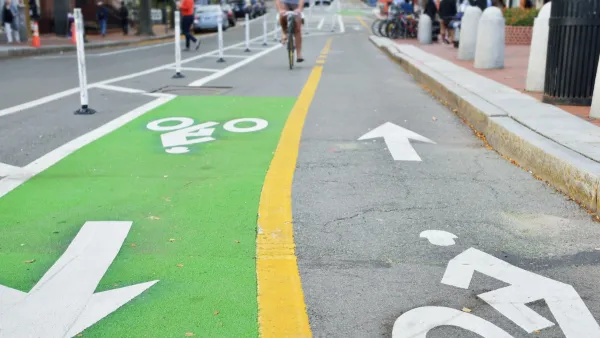Most trends are fleeting, some of them mercifully so. Some last no longer than a Lady Gaga wardrobe change. But urbanism is still, by and large, a leisurely exercise, so it's no wonder that planners still embrace fashions on a nearly generational basis. It often takes that long just to see if something works. Or not. So, while Gaga would inspire us to attach telephones to our heads and light our bustiers on fire, planners who ascribe to the principles of smart growth are still rhetorically swaddling cities in the urban equivalent of flannel. For better or worse, this age may finally be coming to a close. Don't cry, Monster.
Most trends are fleeting, some of them mercifully so. Some last no longer than a Lady Gaga wardrobe change. But urbanism is still, by and large, a leisurely exercise, so it's no wonder that planners still embrace fashions on a nearly generational basis. It often takes that long just to see if something works. Or not.
So, while Gaga would inspire us to attach telephones to our heads and light our bustiers on fire, planners who ascribe to the principles of smart growth are still rhetorically swaddling cities in the urban equivalent of flannel. For better or worse, this age may finally be coming to a close. Don't cry, Monster.

Two weeks ago in USA Today, veteran real estate writer Haya El Nasser reported that the term "smart growth" may have reached the end of its life-cycle. Though cities are embracing smart growth with everything from light rail lines to downtown mixed use developments, planners it seems have simply grown tired of the term. The heir apparent, writes Nasser, is "intelligent cities."
It's unclear whether an "intelligent city" would look any different from a "smart growth" city. As Nasser notes, sometimes people just need a change. I'm not sure that this change is a healthy one, though.
Nasser highlights a few advantages of this term, whose provenance is apparently unknown. By ascribing intelligence to cities, it underscores cities' role as hubs of knowledge, as if the knowledge in a city is greater than that of the sum of its inhabitants. That much is probably true. Moreover, she notes that the use of city -- as opposed to the vaguely cancerous term "growth" -- emphasizes the unequivocal primacy of cities in our culture and economy. With apologies to Joel Kotkin, the age of the intelligent city may not leave much room for the exurb or the reinvented bedroom community.
Just the same, "intelligent cities" is remarkably limiting.
Now more than ever, I don't think anyone knows what a "city" is anymore -- and I say that admiringly. They have grown and changed remarkably, even in the past generation. If cities are producers of knowledge and capital, then we would have to define them broadly, as entire metro areas. But planners rarely deal in such large regions. On the formal, rather than economic, level, planners confront the issue of scale. Is Beverly Hills a city? Is a metropolitan planning or organization or metropolitan statistical area a city? Is Mumbai a city? What about the dozen or so definitions of the Greater Tokyo area?
It's hard to call something "intelligent" if we don't even know what the thing is.
Perhaps more problematic is the abandonment of the expansive concept of growth. "Growth" doesn't happen only in cities. It happens in suburbs, exurbs, hamlets, states, and regions. In my home beat of California, it happens everywhere, and it has been happening consistently since, oh, 1849. To replace "growth" with "cities" carries two erroneous implications: 1) that a city, if it's intelligent enough, can become a static finished product; 2) that certain places that do not happen to be cities need not worry about being "smart."
But the point of urbanism is that someplace do eventually become cities, or at least they become part of cities. The constant process of growth and reinvention is central to our notion of urbanism. Growth does not necessarily equal progress -- i.e. it's not always good -- but even when cities stop growing or even contract, we can never say that they are complete or "done." Smart growth acknowledges that urban development is an unending process.
"Intelligent cities" carries the perilous connotation that a city need only get smarter but not necessarily bigger. Just keep in mind that fully half of humanity, 3.5 billion people, already live in cities. If cities, suburbs, towns, and regions don't keep growing, we're going to have another billion very unhappy people knocking at our gates.
Naturally, "smart growth" is hardly perfect either. But I think it deserves another decade or two, because that's probably how long it will take for those principles to truly take root on the ground.
At least we can dance to Gaga while we wait.

Analysis: Cybertruck Fatality Rate Far Exceeds That of Ford Pinto
The Tesla Cybertruck was recalled seven times last year.

National Parks Layoffs Will Cause Communities to Lose Billions
Thousands of essential park workers were laid off this week, just before the busy spring break season.

Retro-silient?: America’s First “Eco-burb,” The Woodlands Turns 50
A master-planned community north of Houston offers lessons on green infrastructure and resilient design, but falls short of its founder’s lofty affordability and walkability goals.

Test News Post 1
This is a summary

Analysis: Cybertruck Fatality Rate Far Exceeds That of Ford Pinto
The Tesla Cybertruck was recalled seven times last year.

Test News Headline 46
Test for the image on the front page.
Urban Design for Planners 1: Software Tools
This six-course series explores essential urban design concepts using open source software and equips planners with the tools they need to participate fully in the urban design process.
Planning for Universal Design
Learn the tools for implementing Universal Design in planning regulations.
EMC Planning Group, Inc.
Planetizen
Planetizen
Mpact (formerly Rail~Volution)
Great Falls Development Authority, Inc.
HUDs Office of Policy Development and Research
NYU Wagner Graduate School of Public Service




























